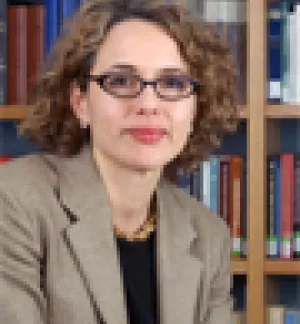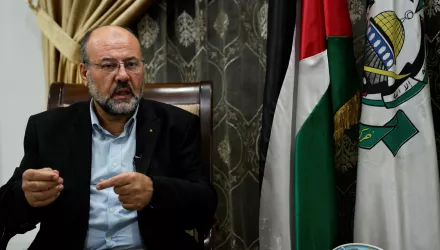A discussion about recent events in the Russian-Chechen conflict and possible connections between Chechen fighters and international Islamist organizations.
Russia’s Struggle with Chechnya:
Implications for the War on International Terrorism
November 26, 2002
Panel:
Monica Toft, Assistant Professor of Public Policy, Kennedy School of Government
Jessica Stern, Lecturer in Public Policy, Kennedy School of Government
Miriam Lanskoy, Doctoral Candidate, Boston University
John Reppert, Executive Director for Research, Belfer Center, Moderator
Inna Ososkova, MPP Student, Kennedy School of Government, Coordinator
On November 26, students from the Kennedy School of Government in conjunction with the Caspian Studies Program assembled a panel of three experts on Chechnya and international terrorism to discuss recent developments in the Russian-Chechen conflict and possible connections between Chechen rebels and international terrorist organizations.
Monica Toft began by arguing that the current situation in Chechnya is one where the rebels are able to win simply “by not losing” and where Russia is unlikely to achieve a decisive military or political victory. Toft expanded on this analysis by providing historical context for the current hostility between Russia and Chechnya and considered Russia’s policy options for resolving the Russian-Chechen conflict.
Toft explained that Russia brought Chechnya under its control in 1859, and the Russian conquest of the Caucasus occupies a prominent place in Russian culture—similar to America’s association with its adventures in the “Wild West” during the same period. Under the pretense of combating possible Nazi influence in Chechnya during World War II, Josef Stalin deported over one-quarter of the Chechen population (mostly to Kazakhstan). Many Chechens were allowed to return to Chechnya during the Khrushchev period, but Chechen mistrust of Moscow persisted over the course of the Soviet period.
The current conflict between Russia and Chechnya began in 1994, when Chechens seized on the breakup of the Soviet empire and tried to gain more autonomy from Moscow. Russian General Pavel Grachev confidently proclaimed that Russia could defeat Chechen rebels “within 48 hours,” but the result of this first Russian-Chechen war of the 1990s was a grueling two-year conflict that led to the deaths of thousands of Russian soldiers and tens of thousands of Chechen civilians.
Russian General Alexander Lebed negotiated a peace agreement in 1996, and there was a respite in the fighting until 1999. During this time, Toft explained, the Russian military came to believe that had merely implemented the “wrong strategy” in Chechnya. When Russian-Chechen hostilities resumed, the Russian military began to rely more heavily on air strikes and long-range artillery assaults. The result, according to Toft, has been an indiscriminant attack on the Chechen population, in which thousands of Chechens have died.
Toft then moved on to discuss the October 2002 Chechen rebel attack at the Dubrovka Theater in Moscow, where over 120 hostages were killed when the Russian military ended the siege. According to Toft, Chechens did use terrorist tactics in this particular instance, but she maintains that there are fundamental differences between the Chechen movements and Islamic fundmentalist groups and organizations in the mold of al-Qaeda. Unlike al-Qaeda, Toft explained, Chechens have specific political aims (centered on the Russian military withdraw from Chechnya) and have attempted to negotiate these political demands with Moscow. In addition, the group consisted solely of Chechens who had specific grievances against Russia, whereas al-Qaeda draws from the disaffected members of a variety of Muslim-majority countries.
Toft then discussed the current Russian government’s policy options on Chechnya. The first is to “declare victory and get out”—granting Chechnya greater autonomy or perhaps independence in the process. Obstacles to this solution include a possible “domino effect” where other Russian regions would follow the Chechen example and secede from the Russian Federation and Russians’ own psychological reluctance to accept a compromise in this situation.
The second solution would be for the Russian military to wage a Stalinist-style “anti-social war” against Chechnya, which Toft indicated would likely have to reach genocidal proportions in order to succeed. This strategy would likely lead to domestic and international condemnation and even if Russia wanted to implement this strategy, it is not clear that it has enough military power to do so. Moreover, if Stalin could not succeed in carrying out this more brutal type of campaign in Chechnya, Toft suggested, there is little reason to believe that the current Russian government would be able to accomplish this end.
The third solution would entail a painful, decades-long battle of counter-insurgency against the Chechen rebels. Toft explained that this strategy appears increasingly difficult since over half the Russian population does not support the government’s current campaign in Chechnya. According to Toft, the first option of “declaring victory and getting out of Chechnya” offers Russia the best chance of solving the current impasse.
In her remarks, Jessica Stern sought to establish ties between Chechen militants and international Islamist organizations. According to Stern, at least some Chechen fighters are terrorists who have essentially sold themselves to Islamist organizations in order to obtain funding for their cause. She then cited some examples of possible al-Qaeda connections to Chechnya—including reports that Mohammad Atta had planned to go to Chechnya and that Ayman al-Zawahiri, Osama bin Ladin’s lieutenant, was arrested in Dagestan en route to Chechnya.
Stern said that al-Qaeda has made extensive use of Chechnya and Afghanistan in its recruitment films as “Islamic lands liberated in the name of jihad.” Stern also indicated that during the late 1990s she met Chechens who were studying at a madrassah in Pakistan that prided itself on sending young recruits to the Taliban in Afghanistan.
Miriam Lanskoy focused her presentation on missed opportunities for resolution of the Russian-Chechen conflict during the interwar period from 1996 to 1999. According to Lanskoy, Chechen President Aslan Maskhadov was willing to work with Moscow to improve the situation and minimize the influence of radical factions within Chechnya, but never received assistance from the Russian government. Lanskoy indicated that Yevgeni Primakov, Russia's former prime minister, has acknowledged that Maskhadov sought Russian support at their October 1998 meeting and had warned Primakov about the possibility that Chechen militant Mosar Basaev might attempt to lead incursions into Daghestan.
Furthermore, Lanskoy argued that the Russian government has placed Maskhadov in a Catch-22 situation. If he is able to assert control over the radical factions in Chechnya, it proves that he is complicit with terrorists and that it would be wrong to negotiate with him. On the other hand, if he cannot control these factions, he is an ineffectual leader and it would be useless to negotiate with him.
Lanskoy also recounted deep and pervasive conflicts between the radical commanders and Maskhadov in Chechnya during the interwar period. However, in the summer of 2002, Maskhadov welcomed these persons (Movladi Udugov, Shamil Basaev, Zelimkhan Yanderbiyev) into his government and on October 22, 2002, he asserted that he was in control of all Chechen factions. According to Lanskoy, Maskhadov's current alliance with these more radical figures "is the result, not the cause of this current war."
During the question and answer session, Lanskoy and members of the audience asked Jessica Stern to provide more information on the examples she cited in linking Chechens to al-Qaeda. According to Lanskoy, there are no Chechens among the al-Qaeda prisoners of war in Afghanistan or Guantanomo Bay, Cuba. In addition, reporters from the New York Times, Radio Liberty, and Le Monde who have gone to Afghanistan to look for Chechens never actually found any. Lanskoy agued that stories about connections between al-Qaeda figures such as Mohammad Atta and Ayman al-Zawahiri are not well-documented and came out long after the fact and in the context of the post-September 11 anti-terrorism efforts. According to Lanskoy, the Russian FSB (Federal Security Services) works hard to exaggerate and manipulate such stories.
Stern maintained that analysts should not ignore the fact that some Chechen fighters have received funding from Saudi sources and that al-Qaeda has attempted to forge links with Chechnya. Elin Suleymanov of the Fletcher School of Government suggested that al-Qaeda’s embrace of Chechnya does not necessarily mean that Chechens have embraced al-Qaeda. Monica Toft agreed with Suleymanov’s assessment that the Chechen resistance has primarily been a localized phenomenon, with a few notable exceptions (most recently, the terrorist attacks on the Dubrovka Theater Theatre in Moscow.) Toft also argued that the Chechens have made “remarkably stupid” tactical mistakes in the instances where they have staged attacks in Russia instead of focusing on their struggle for self-defense within Chechnya.
Summary by John Grennan, Caspian Studies Program
Stern, Jessica and Miriam Lanskoy. “Russia's Struggle with Chechnya: Implications for the War on International Terrorism.” Caspian Studies Program, November 26, 2002



